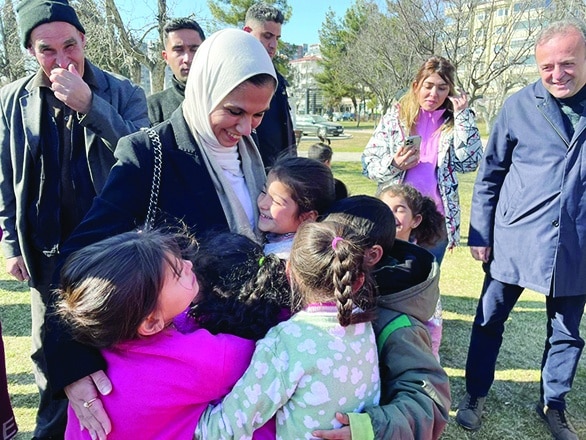GAZIANTEP, Turkey: Kuwaiti Minister of Social Affairs and Minister of State for Women and Childhood Affairs Mai Al-Baghli expressed Kuwait's solidarity and sympathy with Turkey and Syria following the devastating earthquake. Upon her arrival in Gaziantep in southern Turkey, Baghli said: "Today we convey a message that Kuwait stands by the people of Turkey and Syria following the devastating earthquake that struck the two countries last week," expressing condolences to the families of the victims and wishing the injured a speedy recovery.
Baghli also affirmed that Kuwait is closely following the unfortunate events, noting that her visit aims to follow up on the progress of relief operations in conjunction with the Kuwait by Your Side campaign, which was launched in implementation of the directives of HH the Amir Sheikh Nawaf Al-Ahmad Al-Jaber Al-Sabah. Baghli flew to Turkey on a Kuwait Air Force plane, accompanied by Turkish Ambassador to Kuwait Tuba Sonmez.
Turkish Deputy Minister of Family and Social Services Ridvan Duran expressed his country's appreciation for Kuwait's stance, thanking the Kuwaiti leadership, government and people for standing by the Turkish people in this difficult time. The Kuwaiti "airbridge" includes the participation of Kuwait Fire Force, which takes the initiative to deal with the effects of the earthquake and contribute to search and rescue operations. The Kuwaiti health ministry and Kuwait Red Crescent Society are also taking part in providing medical, pharmaceutical support and the necessary urgent healthcare, as Kuwaiti charities continue their relief work.
Meanwhile, the first UN team arrived Tuesday in rebel-held northwestern Syria since last week's devastating Turkey-Syria earthquake, while anger simmers at the world body's slow response to the disaster that killed over 35,000 people and impacted millions of children in the region. As hopes fade of finding people alive under the debris more than a week after the 7.8-magnitude quake struck, the focus has switched to providing food and shelter to the vast numbers of survivors.
But activists and emergency teams in Syria's northwest have decried the UN's slow response to the quake in rebel-held areas, contrasting it with the planeloads of humanitarian aid that have been delivered to government-controlled airports. "I don't want to sit here and give excuses, but I wanted to share that we are all collectively in the same place," Sanjana Quazi, who heads the UN Office for the Coordination of Humanitarian Affairs in Turkey, told reporters in the rebel-held town of Sarmada.
Fears have grown for survivors on both sides of the border, with the UN saying more than seven million children have been negatively impacted between Syria and Turkey, and noting fears that "many thousands" more had died. "It is tragically clear that numbers will continue to grow," said James Elder, spokesman for the UN children's agency UNICEF, adding that the final toll would be "mind-boggling".
The confirmed death toll from the quake stands at 35,662 as officials and medics said 31,974 people had died in Turkey and at least 3,688 in Syria. The count has barely changed in Syria for several days and was expected to rise. The disaster's mental strain was accompanied by the hard realities of surviving in cities turned to ruin in the middle of the winter freeze.
In Turkey's Kahramanmaras, huge crowds depended on a single toilet that still functioned in a central mosque. "There are no toilets, the toilets should be set up in tents," Husne Duz, 53, who has lived with thousands of others in a tent city for the past week. "I walk five kilometers every day to come here for a toilet. We cannot find any other place," Erdal Lale, 44, told AFP. The acrid smell of smoke from hundreds of fires that people have kept going to keep away the cold permeated much of Turkey's disaster zone. "We need to take showers. There is a need for washing machines for clothes," Duz said.
In the devastated Turkish city of Antakya, clean-up teams have been shifting rubble and putting up basic toilets as the telephone network started to come back in parts of the town, an AFP reporter said. Food and other aid supplies were flowing in to the city, as well as Kahramanmaras, AFP teams reported. But getting aid into neighboring Syria, already racked by 12 years of civil war, is of particular concern.
Syrian President Bashar Al-Assad, isolated and subject to Western sanctions, called for international assistance to help rebuild infrastructure in the country. A Saudi plane carrying aid landed in second city Aleppo, the first in more than a decade of war in Syria, a transport ministry official told AFP, with two more consignments expected later this week.
UN Secretary-General Antonio Guterres said Monday Assad has agreed to open two more border crossings from Turkey to northwest Syria to allow in aid. Before the earthquake struck, almost all of the crucial humanitarian aid for the more than four million people living in rebel-controlled areas of northwest Syria was being delivered through just one crossing.
A week after the Feb 6 quake toppled buildings across the region, people were still being found alive under the rubble. Doctors at a field hospital in Turkey's Antakya were trying to save people who were pulled out after being buried for days under debris in the freezing cold. "It's a miracle to find a patient still alive under the rubble," doctor Yilmaz Aydin told AFP. "From now on, the survivors are likely to be in a more critical condition. The majority of them will need life-saving treatment," said Aydin. One is 25-year-old Syrian woman Abir, who spent 180 hours trapped under the rubble. "Her heart stopped two times but we managed to bring her back," said doctor Nihat Mujdat Hokenek. - Agencies










